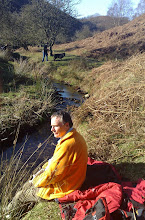I cannot stress enough how important verbs are in a poem. Here’s an example of excellent verb use in a well-known poem:
from Ariel
Black sweet blood mouthfuls, Shadows. Something else Hauls me through air—— Thighs, hair; Flakes from my heels. White Godiva, I unpeel—— Dead hands, dead stringencies. And now I Foam to wheat, a glitter of seas. The child’s cry Melts in the wall. And I Am the arrow, The dew that flies, Suicidal, at one with the drive Into the red Eye, the cauldron of morning. Sylvia Plath
This poem uses verbs very effectively. “Something else / hauls me through air.” “Thighs, hair; / Flakes from my heels.” “I unpeel” “I /Foam to wheat.” “The child’s cry / Melts in the wall.” [my emphasis]
The resulting effect of using active verbs in a poem is that your reader will be able to experience the action of the poem in their head, rather than just hear about it. So many poor poems are reported. “This happened. That happened. Something else is happening.”
The reason using “being verbs,” adverbs, and adjectives to depict the images in your poetry is ineffective is that it unnecessarily removes the reader from the experience of the poem. When a poem is reportedrather than enacted the poet serves as an intermediary between the poem and the reader.
Think about it this way: would you rather look at a beautiful sunset or have someone describe one to you?
This will be covered in greater detail in an upcoming installment (this phrase is becoming a mantra of this series).
For the remainder of this article we’re going to assume you’ve completed a poem and want to make a first-pass at improving it.
Jough Dempsey is a poet & critic and the webmaster of Poetry X

No comments:
Post a Comment